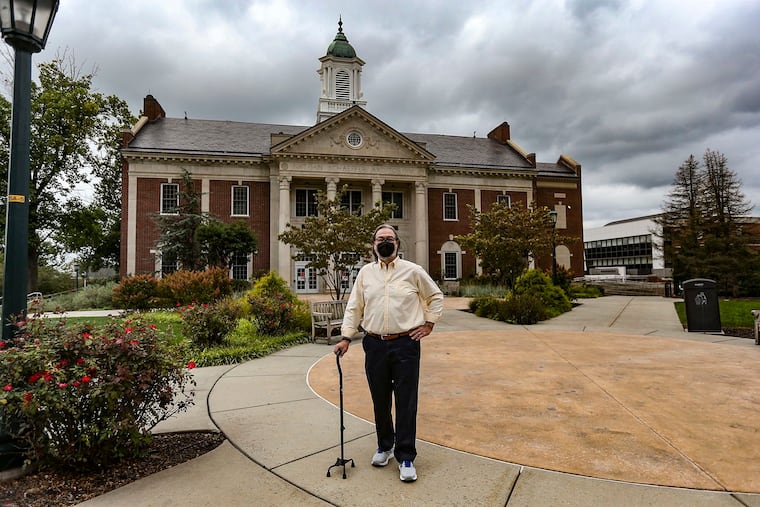Kutztown professor with heart transplant should have been able to teach from home, judge says
“Instead of showing compassion to a valued tenured professor ... the university showed callous indifference,” wrote U.S. District Court judge Jeffrey L. Schmehl.

A Kutztown University professor who had a recent heart transplant and was denied his request to teach online during the pandemic has won a victory in court.
A U.S. District Court judge ruled last month that Stephen Oross III, 63, an associate professor of psychology at the Berks County state university, should have been allowed to continue to teach online even after the school moved instruction back to in-person.
“Instead of showing compassion to a valued tenured professor, who, despite having recently underwent a heart transplant and was trying with ‘all his might to return to campus’ for the Fall 2021 Semester, the university showed callous indifference by refusing to consider Professor Oross’s individual circumstances as the law required,” wrote U.S. District Court Judge Jeffrey L. Schmehl.
» READ MORE: A professor got a heart transplant, so he wanted to teach online. His university said no.
Instead, the university summarily denied his request for a remote accommodation “based on a recently devised, inflexible and unsubstantiated policy that any request to change the course modality from in-person to remote would be considered a substantial alteration to the course offerings and would represent an undue hardship to the university and its students,” Schmehl found.
But the judge did not grant summary judgment on damages, and Oross and his West Chester-based lawyer, Lorrie McKinley, said they are asking the court for reconsideration. At this point though, he is entitled to back pay, his lawyer said.
McKinley said the issue of being able to work remotely is really important to those with disabilities, far beyond the pandemic implications.
“There are some people foreclosed from having a job just because they can’t access the workplace,” she said. “But they are qualified to do the work. We have to start understanding remote work accommodations as something like a virtual ramp.”
Kutztown University spokesperson Matthew Santos said the university’s lawyers, along with lawyers for the Pennsylvania State System of Higher Education, of which Kutztown is a part, are reviewing the judge’s decision.
» READ MORE: Vaccinated vs. unvaccinated roommates: As college students move in, some parents and students have concerns
Oross had a heart transplant in February 2021, amid the pandemic. With cases of COVID-19 still surging, he didn’t feel safe returning to in-person teaching, and his doctors warned against it. Kutztown at the time required masks but didn’t mandate the vaccine, so he faced the possibility of being in classrooms with unvaccinated students and little room for social distancing.
After the university denied his request to teach remotely, he took an unpaid leave of absence for the semester.
Oross’ request was one of four that Kutztown received, and all were denied.
“The decisions were based on the requester providing the appropriate medical documentation, the impact of the disability, and whether or not the requested accommodation met the ADA definition of ‘reasonable,’” Santos said at that time. “Accommodations are considered reasonable if they do not create an undue hardship, do not cause a direct threat to health or safety of others, or would not constitute a fundamental alteration.”
» READ MORE: Attention Pa. state students: Your tuition costs will remain the same for another year
The four were approved for family medical leave, Santos said at that time, which would have allowed them to draw on benefits offered by Kutztown and the state system, including the use of up to 90 accrued paid sick leave days per calendar year.
Oross’ case came as universities around the country were attempting to return to as normal of a year as possible with in-person classes, following the release of COVID-19 vaccines. Some professors, like Oross, were seeking exemptions for a number of reasons. Absent universal guidelines, colleges set differing bars, some saying they were guided by the Americans with Disabilities Act, which allows for “reasonable” accommodations. Some took a hard line, leaving nearly no room for exception.
The judge found that allowing Oross to teach and conduct office hours online would not have “fundamentally altered the university’s pedagogical model.” The university, the judge said, did not show “any effort, let alone a good-faith effort to accommodate” him, upholding Oross’ discrimination claim.
Oross said he hopes the judge’s ruling “translates into assistance for other faculty members who have been denied accommodations, some of whom have also sued.”
Oross, of Fleetwood, continues to teach remotely under an agreement his lawyer negotiated through the court while the litigation continues. He said he’ll be teaching four courses in the fall.
He also said he is talking with faculty elsewhere in Pennsylvania who are suffering from long COVID-19 and seeking accommodations, as well as people in other states.
“I’m hoping this helps those individuals who have medical reasons for working remotely,” he said, “and as long as the job can be done remotely, [it] gives them that option.”